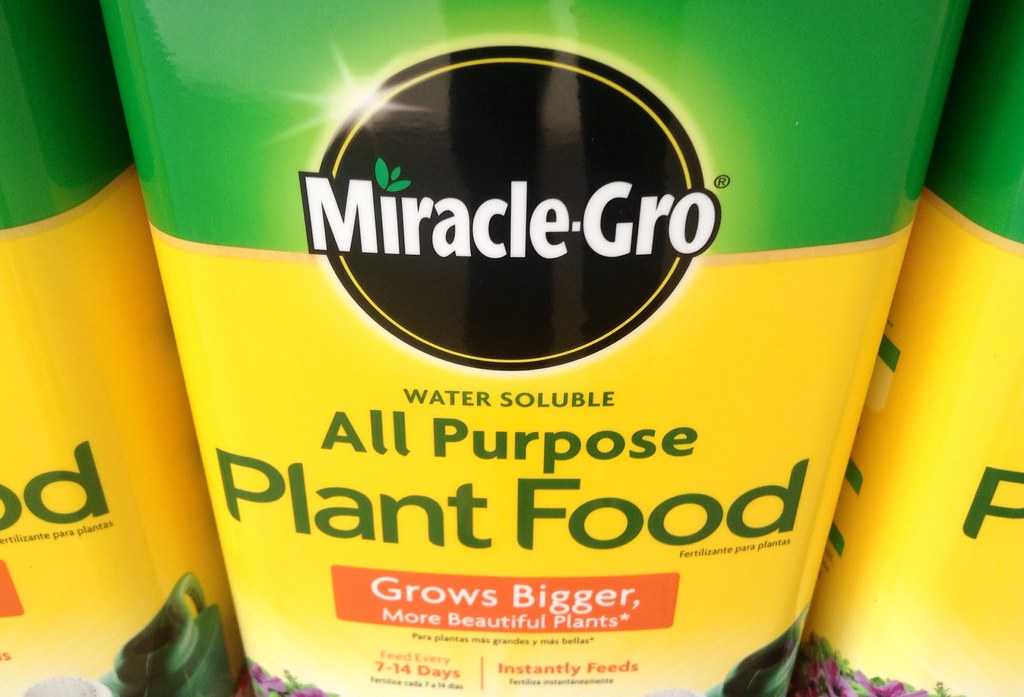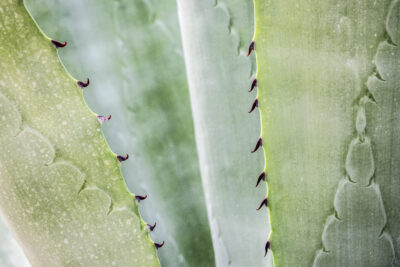
Using Regular Miracle Gro Fertilizer: Is it Suitable for Succulents?

Succulents are a popular choice for many plant enthusiasts due to their unique and eye-catching appearance. These plants have adapted to survive in arid and dry climates by storing water in their leaves, stems, or roots. While they are known for their ability to thrive in low-nutrient conditions, providing them with the right nutrients can help them grow healthier and more vibrant. However, not all fertilizers are suitable for succulents, and using the wrong type of fertilizer can do more harm than good.
We will discuss the use of regular Miracle Gro fertilizer for succulents. Miracle Gro is a well-known brand that offers a wide range of fertilizers for different types of plants. However, their regular fertilizer formula is not specifically designed for succulents, which raises the question of whether it is suitable for these unique plants. We will explore the pros and cons of using Miracle Gro on succulents, as well as alternative fertilization methods that may be more appropriate for these plants. If you are a succulent lover or considering adding these plants to your collection, read on to find out more about using regular Miracle Gro fertilizer for succulents.
- No, regular Miracle Gro fertilizer is not suitable for succulents
- Succulents have specific nutrient requirements that regular fertilizer may not meet
- Succulents prefer a well-draining soil and too much fertilizer can lead to root rot
- It is recommended to use a specialized fertilizer formulated for succulents
- Look for a fertilizer with a higher phosphorus content to promote blooming and root growth
- Follow the instructions on the fertilizer package for correct application and dosage
- Be cautious not to over-fertilize, as this can harm the succulents
- Consider using organic fertilizers or slow-release fertilizers for long-lasting nutrients
- Monitor the health of your succulents and adjust the fertilization accordingly
- It's always best to research and choose a fertilizer specifically designed for succulents
- Frequently Asked Questions
No, regular Miracle Gro fertilizer is not suitable for succulents
Succulents are a unique type of plant that have adapted to survive in dry and arid conditions. Their thick, fleshy leaves and stems allow them to store water for long periods of time, making them highly resilient to drought. Because of their specific water requirements, using regular Miracle Gro fertilizer on succulents is not recommended.
Why is regular Miracle Gro fertilizer not suitable for succulents?
Succulents have evolved to thrive in nutrient-poor soil, and they have adapted to extract the necessary nutrients from their environment. Regular Miracle Gro fertilizer is designed for a wide range of plants and contains high levels of nitrogen, phosphorus, and potassium. While these nutrients are essential for the growth and development of most plants, succulents have different needs.
What do succulents need?
 Succulent Care on Wood: A Guide to Proper Maintenance
Succulent Care on Wood: A Guide to Proper MaintenanceSucculents require a well-draining soil mix that replicates their natural habitat. Too much nitrogen, phosphorus, and potassium can lead to excessive growth, weak stems, and root rot in succulents. Instead, succulents benefit from a fertilizer that is specifically formulated for their unique needs.
What fertilizer should you use for succulents?
When it comes to fertilizing succulents, it is best to use a fertilizer that is low in nitrogen and high in phosphorus and potassium. Look for a fertilizer specifically labeled for succulents or cacti. These fertilizers are formulated to provide the necessary nutrients without promoting excessive growth.
How often should you fertilize succulents?
Fertilizing succulents should be done sparingly. Over-fertilizing can cause harm to succulents and disrupt their natural growth patterns. It is recommended to fertilize succulents once or twice a year, typically during the growing season in spring and summer.
Conclusion
Regular Miracle Gro fertilizer is not suitable for succulents. These unique plants have specific needs when it comes to nutrients, and using a fertilizer designed for a wide range of plants can potentially harm them. To ensure the health and vitality of your succulents, opt for a fertilizer specifically formulated for succulents or cacti, and remember to use it sparingly.
 Reviving an Overwatered Succulent: Tips to Save Your Plant
Reviving an Overwatered Succulent: Tips to Save Your PlantSucculents have specific nutrient requirements that regular fertilizer may not meet
When it comes to caring for succulents, it's important to provide them with the right nutrients to ensure their health and vitality. While regular Miracle Gro fertilizer is a popular choice for many garden plants, it may not be suitable for succulents. Succulents have specific nutrient requirements that differ from other plants, and using a fertilizer specifically formulated for succulents is recommended to meet their unique needs.
Succulents are known for their ability to store water in their leaves, stems, and roots, which allows them to thrive in arid conditions. This water storage adaptation means that succulents have different nutritional needs compared to plants that rely on regular watering. They require a fertilizer that is low in nitrogen and high in phosphorus and potassium.
The Importance of Nitrogen, Phosphorus, and Potassium for Succulents
Nitrogen: While nitrogen is an essential nutrient for plant growth, succulents require less of it compared to other plants. Too much nitrogen can cause succulents to grow too quickly, resulting in weak and leggy stems. This is why it's important to use a fertilizer with a lower nitrogen content when feeding your succulents.
Phosphorus: Phosphorus plays a crucial role in root development, flowering, and fruiting. Succulents benefit from higher levels of phosphorus, as it promotes strong root growth and enhances their ability to absorb water and nutrients from the soil. A fertilizer with a higher phosphorus content will help support the overall health and growth of your succulents.
Potassium: Potassium is essential for succulents as it helps regulate water movement within the plant. It aids in the proper functioning of stomata, which are tiny openings on the surface of the leaves that allow for gas exchange. Adequate potassium levels promote healthy and robust succulents, as it helps prevent issues such as wilting and dehydration.
Choosing a Fertilizer for Succulents
When selecting a fertilizer for your succulents, it's important to choose one that is specifically formulated for these types of plants. Look for a fertilizer with a low nitrogen content, such as a 2-7-7 or 0-10-10 ratio, which means it has a higher phosphorus and potassium content. These ratios will provide the necessary nutrients for your succulents without promoting excessive growth.
Add the fertilizer to your succulents' soil according to the instructions on the packaging. Remember to only fertilize your succulents during their active growing season, which is typically in spring and summer. During the dormant period in fall and winter, succulents require less fertilizer or may not need it at all.
 Succulent Care: Pruning Damaged Leaves
Succulent Care: Pruning Damaged LeavesConclusion: While regular Miracle Gro fertilizer may be suitable for other plants in your garden, it's important to choose a fertilizer specifically formulated for succulents to meet their unique nutrient requirements. By providing your succulents with the right balance of nutrients, you'll help them thrive and maintain their stunning beauty.
Succulents prefer a well-draining soil and too much fertilizer can lead to root rot
Succulents are known for their ability to store water in their leaves, stems, and roots, allowing them to survive in arid conditions. One of the key factors in keeping succulents healthy is providing them with a well-draining soil.
While fertilizing your plants is important for their overall growth and health, it is crucial to use the right type and amount of fertilizer for succulents. Using regular Miracle Gro fertilizer, which is typically designed for general use on a variety of plants, may not be suitable for succulents.
Succulents have unique growth habits and nutrient requirements that differ from other types of plants. They are adapted to survive in nutrient-poor soils, and too much fertilizer can actually harm them. Over-fertilizing succulents can lead to an imbalance of nutrients and excessive growth, which can make the plants more susceptible to root rot.
Why is regular Miracle Gro fertilizer not suitable for succulents?
Regular Miracle Gro fertilizer is formulated to provide a balanced mix of nutrients that promote lush growth in a wide range of plants. However, succulents have evolved to thrive in nutrient-poor environments, and they thrive best when they are not overfed.
Most succulents prefer soil that is lean and well-draining, with a low organic matter content. Regular Miracle Gro fertilizer, on the other hand, is typically high in nitrogen, which can encourage excessive leaf growth and make the plants more susceptible to diseases and pests.
Additionally, regular Miracle Gro fertilizer contains a combination of macronutrients (nitrogen, phosphorus, and potassium) in equal proportions. Succulents, however, have different nutrient requirements, with a greater need for potassium and a lower need for nitrogen and phosphorus.
 The Ultimate Guide to Succulent Care: Everything You Need to Know
The Ultimate Guide to Succulent Care: Everything You Need to KnowSo, what type of fertilizer should you use for succulents?
When it comes to fertilizing succulents, it is best to use a specialized fertilizer that is specifically formulated for these plants. Look for a fertilizer that has a higher potassium content and a lower nitrogen and phosphorus content.
Succulent-specific fertilizers are designed to provide the essential nutrients that succulents need, while minimizing the risk of over-fertilization. These fertilizers are typically more diluted and have a lower nitrogen content, ensuring that the plants receive the nutrients they require without being overwhelmed.
Remember, when it comes to succulents, less is more. It is better to under-fertilize than to over-fertilize. Always follow the instructions on the fertilizer package and adjust the amount and frequency of fertilization based on the needs of your specific succulent species.
While regular Miracle Gro fertilizer may be suitable for many types of plants, it is not the best choice for succulents. To ensure the health and longevity of your succulents, opt for a specialized fertilizer that meets their unique nutrient requirements.
It is recommended to use a specialized fertilizer formulated for succulents
Succulents are known for their ability to store water in their leaves and stems, making them quite different from other plants. Due to this unique characteristic, succulents have specific nutritional needs that differ from those of traditional plants.
While regular Miracle Gro fertilizer is a popular choice for many gardeners, it may not be the best option for succulents. Miracle Gro is a general-purpose fertilizer that is designed to provide a balanced mix of nutrients for various types of plants.
However, succulents require a different nutrient balance to thrive and maintain their unique characteristics. They need a fertilizer that is low in nitrogen and high in phosphorus and potassium. This helps promote healthy root development, prevent excessive growth, and enhance the vibrancy of their colors.
 Preventing Succulent Stem Growth: Tips for Compact, Healthy Plants
Preventing Succulent Stem Growth: Tips for Compact, Healthy PlantsWhy is a specialized fertilizer necessary for succulents?
Succulents have adapted to survive in arid environments where water is scarce. Their ability to store water allows them to withstand long periods of drought. However, this adaptation also means that they are more sensitive to overwatering and excessive nutrient levels.
A specialized fertilizer for succulents takes these factors into account. It provides the necessary nutrients in the right proportions, ensuring that succulents receive what they need without being overwhelmed.
What should you look for in a fertilizer for succulents?
When choosing a fertilizer for your succulents, look for one that is specifically formulated for these types of plants. It should have a lower nitrogen content (the first number on the fertilizer label) and higher phosphorus and potassium levels (the second and third numbers, respectively).
Additionally, organic fertilizers can be a great option for succulents. They release nutrients slowly, allowing the plants to absorb them more efficiently. Organic fertilizers also improve soil structure, which is beneficial for succulents that require well-draining soil.
How to properly fertilize succulents
- Choose a specialized fertilizer that is suitable for succulents.
- Follow the instructions on the fertilizer packaging for the proper dilution ratio.
- Apply the fertilizer sparingly to avoid overfeeding your succulents.
- Water your succulents before applying the fertilizer to ensure that the nutrients are absorbed effectively.
- Apply the fertilizer during the active growing season, typically in spring and summer, when the succulents need the most nutrients.
- Monitor your succulents for any signs of nutrient deficiency or excess, such as yellowing leaves or stunted growth. Adjust the fertilizer application accordingly.
Remember, while regular Miracle Gro fertilizer may work for some plants, it is not the best choice for succulents. By using a specialized fertilizer formulated for succulents, you can provide them with the optimal nutrients they need to thrive and maintain their unique beauty.
Look for a fertilizer with a higher phosphorus content to promote blooming and root growth
When it comes to fertilizing your succulents, it's important to choose the right type of fertilizer. While regular Miracle Gro fertilizer is a popular choice for many plants, it may not be the best option for succulents.
 Revive Your Dying Succulent with These Essential Tips
Revive Your Dying Succulent with These Essential TipsSucculents have unique needs when it comes to nutrients, and using a fertilizer with a higher phosphorus content can help promote blooming and root growth. Regular Miracle Gro fertilizer typically contains a balanced ratio of nitrogen, phosphorus, and potassium, which may not provide the ideal nutrient balance for succulents.
Instead, look for a fertilizer specifically formulated for succulents or one with a higher phosphorus content. This will ensure that your succulents are getting the nutrients they need to thrive. A higher phosphorus content in the fertilizer will help stimulate flower production and encourage strong root development, both of which are important for the overall health of your succulents.
When choosing a fertilizer for your succulents, it's also important to consider the dilution rate. Succulents are adapted to survive in nutrient-poor environments, so they don't require as much fertilizer as other plants. Dilute the fertilizer according to the package instructions or use a weaker concentration to avoid over-fertilization, which can lead to root burn and other issues.
Additionally, it's important to note that succulents are drought-tolerant plants, and over-fertilization can disrupt their natural water balance. This can result in their leaves becoming soft and mushy or even causing root rot. Therefore, it's crucial to follow the recommended fertilization schedule and not exceed the recommended dosage.
While regular Miracle Gro fertilizer can be suitable for many plants, it may not provide the ideal nutrient balance for succulents. Look for a fertilizer with a higher phosphorus content to promote blooming and root growth in your succulents, and remember to dilute it properly and follow the recommended fertilization schedule to avoid over-fertilization.
Follow the instructions on the fertilizer package for correct application and dosage
When it comes to fertilizing your succulents, it's important to use the right kind of fertilizer and follow the instructions for proper application. Many gardeners wonder if regular Miracle Gro fertilizer, a popular choice for houseplants and gardens, is suitable for succulents.
 Causes of Brown and Falling Bottom Leaves in Succulents
Causes of Brown and Falling Bottom Leaves in SucculentsThe answer is both yes and no.
Succulents have unique needs when it comes to fertilizer. They require a fertilizer that is specifically formulated for their low-nutrient needs and their ability to store water. Regular Miracle Gro fertilizer, on the other hand, is designed for plants that have higher nutrient requirements.
While regular Miracle Gro fertilizer may not be the best choice for succulents, it can still be used if you follow the instructions on the package carefully. Here are a few tips to keep in mind:
1. Dilute the fertilizer
Regular Miracle Gro fertilizer can be quite strong for succulents, so it's important to dilute it before use. Follow the instructions on the package to determine the correct dilution ratio. Typically, a ratio of 1 teaspoon of fertilizer per gallon of water is recommended for succulents.
2. Apply sparingly
Succulents have a low nutrient requirement, so it's best to apply fertilizer sparingly. Over-fertilizing can lead to nutrient burn and damage to the plants. Apply the diluted fertilizer solution to the soil around the succulents, avoiding direct contact with the leaves or stems.
3. Adjust the frequency
Succulents are slow-growing plants and do not require frequent fertilization. It's best to fertilize them sparingly, about once every 2-3 months during the growing season (spring and summer). During the dormant season (fall and winter), it's best to avoid fertilization altogether.
4. Consider specialized succulent fertilizers
While regular Miracle Gro fertilizer can be used with caution, there are specialized fertilizers available on the market that are specifically formulated for succulents. These fertilizers have a balanced nutrient ratio that suits succulents' unique needs and helps promote healthy growth.
 Using Miracle-Gro on Succulents: Is it Safe or Harmful?
Using Miracle-Gro on Succulents: Is it Safe or Harmful?While regular Miracle Gro fertilizer can be used for succulents, it is important to dilute it, apply it sparingly, adjust the frequency, and consider specialized succulent fertilizers for optimal growth and health of your succulent plants.
Be cautious not to over-fertilize, as this can harm the succulents
Succulents are known for their ability to thrive in harsh conditions with minimal care. One important aspect of their care is providing them with the right amount of fertilizer. While regular Miracle Gro fertilizer is a popular choice for many plants, it may not be suitable for succulents.
Why is regular Miracle Gro fertilizer not ideal for succulents?
Succulents have unique nutritional needs compared to other plants. They are adapted to survive in arid environments with low nutrient availability. Regular Miracle Gro fertilizer is formulated for plants that require higher nutrient levels and more frequent feeding. Using this fertilizer on succulents can lead to over-fertilization, which can be detrimental to their health.
The dangers of over-fertilization
Over-fertilizing succulents can have several negative consequences. Firstly, it can cause excessive growth, leading to elongated and weak stems. Succulents are prized for their compact and sturdy growth habit, so over-fertilization can compromise their natural aesthetics.
 Can Succulents Survive the Cold Winter Months? Tips for Winter Care
Can Succulents Survive the Cold Winter Months? Tips for Winter CareSecondly, excessive nutrients in the soil can disrupt the delicate balance of water absorption in succulents. This can result in root rot, which is a common issue among over-fertilized succulents. Root rot occurs when the roots are unable to absorb water properly, leading to their decay and eventual death of the plant.
Alternatives to regular Miracle Gro fertilizer for succulents
When it comes to fertilizing succulents, it's best to opt for a specialized fertilizer that is formulated specifically for these plants. Succulent fertilizers typically have lower nitrogen levels and higher phosphorus and potassium content, which better suit the nutritional needs of these plants.
Another alternative is to use organic fertilizers such as compost or worm castings. These natural fertilizers provide a gentle and slow-release source of nutrients, allowing succulents to absorb them at their own pace without the risk of over-fertilization.
Conclusion
Regular Miracle Gro fertilizer may not be suitable for succulents due to their unique nutritional requirements. Over-fertilization can harm these plants and lead to issues such as weak growth and root rot. It's important to choose a fertilizer specifically formulated for succulents or opt for organic alternatives to provide the right amount of nutrients without risking their health.
Consider using organic fertilizers or slow-release fertilizers for long-lasting nutrients
When it comes to fertilizing your succulents, it's important to choose the right type of fertilizer. While regular Miracle Gro fertilizer is a popular choice for many plants, it may not be suitable for succulents.
 The Lifespan of Indoor Succulents: How Long Do They Typically Live?
The Lifespan of Indoor Succulents: How Long Do They Typically Live?Succulents are unique plants that have adapted to survive in arid environments, which means they have different nutrient requirements compared to other plants. Regular Miracle Gro fertilizer is typically formulated for plants that require more frequent watering and higher levels of nitrogen, phosphorus, and potassium.
Instead of using regular Miracle Gro fertilizer, it's recommended to consider using organic fertilizers or slow-release fertilizers for your succulents. These types of fertilizers provide a more balanced and gentle release of nutrients over an extended period of time, which is better suited for succulents' slower growth rate.
Organic fertilizers, such as compost or worm castings, are derived from natural sources and provide a wide range of essential nutrients for your succulents. They also help improve the soil structure and promote beneficial soil microorganisms, which can enhance the overall health and vitality of your plants.
On the other hand, slow-release fertilizers are specially formulated to release nutrients gradually over several months. This allows your succulents to receive a steady supply of nutrients without the risk of over-fertilization, which can be detrimental to their health.
When choosing a fertilizer for your succulents, it's important to read the label carefully and look for a formulation specifically designed for succulents or cacti. These fertilizers are usually lower in nitrogen and higher in phosphorus and potassium, which mimic the nutrient ratios found in their natural habitat.
In addition to choosing the right fertilizer, it's essential to follow the recommended dosage and application instructions. Over-fertilizing your succulents can lead to nutrient burn or imbalances, causing damage to the plants.
Regular Miracle Gro fertilizer may not be suitable for succulents due to their unique nutrient requirements. Instead, consider using organic fertilizers or slow-release fertilizers that provide a more balanced and gentle release of nutrients over time. Always choose a fertilizer specifically formulated for succulents and follow the recommended dosage to ensure the health and vitality of your plants.
Monitor the health of your succulents and adjust the fertilization accordingly
When it comes to taking care of succulents, proper fertilization is key. While succulents are known for their ability to thrive in low-nutrient environments, providing them with the right amount of nutrients can help them grow healthier and more vibrant.
One popular option for fertilizing plants is the regular Miracle Gro fertilizer. However, before you start using it on your succulents, it's important to understand whether it is suitable for these specific plants.
Understanding Miracle Gro fertilizer
Miracle Gro is a well-known brand that offers a wide range of plant fertilizers. Their regular fertilizer is designed to provide plants with a balanced nutrient mixture, including nitrogen, phosphorus, and potassium (NPK). These essential nutrients are crucial for promoting plant growth, flowering, and overall health.
However, succulents have slightly different nutritional requirements compared to other plants. They are adapted to survive in arid conditions and store water in their leaves, stems, or roots. This means that they have a lower tolerance for excessive moisture and higher levels of nutrients.
Is regular Miracle Gro suitable for succulents?
While regular Miracle Gro fertilizer can provide some benefits to succulents, it is important to exercise caution when using it. The high levels of nitrogen in this fertilizer can lead to overstimulation of growth, resulting in weak and leggy succulents.
Instead of using regular Miracle Gro, it is recommended to opt for a specialized succulent fertilizer, which has lower nitrogen levels and a higher ratio of phosphorus and potassium. These nutrients will support root development, enhance flowering, and promote overall plant health without the risk of overfertilization.
Alternatives to consider
If you prefer using a commercial fertilizer, look for products specifically formulated for succulents or cacti. These fertilizers often have a balanced ratio of nutrients tailored to the needs of these plants.
Alternatively, you can make your own homemade succulent fertilizer by creating a nutrient-rich soil mix or using organic options like compost or worm castings. This allows you to have better control over the nutrient levels and ensure a more balanced feeding schedule for your succulents.
While regular Miracle Gro fertilizer can be used on succulents, it is not the most suitable option due to its high nitrogen content. To ensure the health and longevity of your succulents, it is best to opt for a specialized succulent fertilizer or consider making your own homemade alternative. Remember, monitoring the health of your succulents and adjusting the fertilization accordingly is key to their overall well-being.
It's always best to research and choose a fertilizer specifically designed for succulents
If you're a succulent enthusiast, you know that these plants have unique care requirements. One of the most important aspects of succulent care is choosing the right fertilizer. While there are various options available, it's always best to research and choose a fertilizer specifically designed for succulents.
Why is it important to use a fertilizer specifically designed for succulents?
Succulents have specific needs when it comes to nutrients and water retention. Using a regular fertilizer, such as Miracle Gro, may not provide the ideal balance of nutrients for these plants. Regular fertilizers are often formulated for plants with higher water requirements and may contain higher levels of nitrogen and phosphorus, which can be detrimental to succulents.
Benefits of using a fertilizer designed for succulents
1. Balanced nutrient composition: Succulent-specific fertilizers are formulated to provide the perfect balance of nutrients that succulents need. They usually have a lower nitrogen and phosphorus content and higher levels of potassium. This balance promotes healthy growth, vibrant colors, and overall plant health.
2. Improved water retention: Succulents are known for their ability to store water in their leaves and stems. Using a fertilizer designed for succulents can help enhance their water retention capabilities. These fertilizers often contain organic matter, such as compost or peat moss, which improves the soil's ability to retain moisture.
3. Reduced risk of over-fertilization: Regular fertilizers can easily lead to over-fertilization in succulents. Succulent-specific fertilizers are formulated to release nutrients slowly over time, preventing the risk of nutrient burn or excessive growth. This ensures that your succulents receive the right amount of nutrients without being overwhelmed.
How to choose the right fertilizer for your succulents
When selecting a fertilizer for your succulents, consider the following:
- Look for a fertilizer specifically labeled for succulents or cacti.
- Check the nutrient composition on the packaging. Aim for a balanced NPK ratio, such as 2-4-2 or 1-2-1.
- Consider organic fertilizers, as they are gentler on the plants and the environment.
- Read reviews and recommendations from other succulent enthusiasts to find a reputable brand.
In conclusion
While regular Miracle Gro fertilizer may work for some plants, it's not the best choice for succulents. By using a fertilizer specifically designed for succulents, you can ensure that your plants receive the right nutrients in the right proportions. This will promote healthy growth, vibrant colors, and overall thriving succulents in your collection.
Frequently Asked Questions
1. Can I use regular Miracle Gro fertilizer for my succulents?
No, regular Miracle Gro fertilizer is not suitable for succulents. Succulents have specific nutrient requirements, and using regular fertilizer can lead to overfeeding and root rot.
2. What kind of fertilizer should I use for my succulents?
It is best to use a balanced, water-soluble fertilizer specifically formulated for succulents. Look for a fertilizer with a lower nitrogen content and higher phosphorus and potassium levels.
3. How often should I fertilize my succulents?
Succulents have a slow-growing nature and don't require frequent fertilization. It is recommended to fertilize them once a month during the growing season (spring and summer) and withhold fertilizer during the dormant period (fall and winter).
4. Are there any organic fertilizers suitable for succulents?
Yes, there are organic fertilizers available for succulents. Look for organic fertilizers specifically formulated for cacti and succulents, which provide the necessary nutrients without the risk of chemical buildup in the soil.
If you want to read more articles similar to Using Regular Miracle Gro Fertilizer: Is it Suitable for Succulents?, you can visit the Care and Maintenance category.






You Must Read